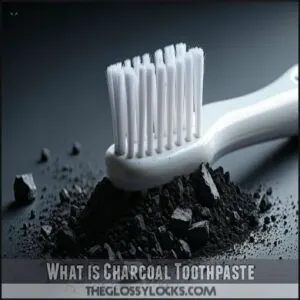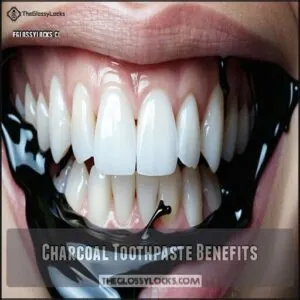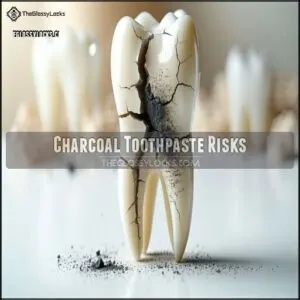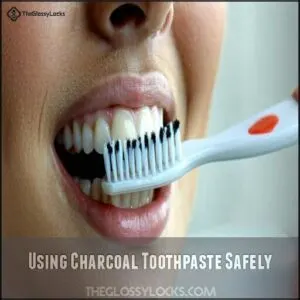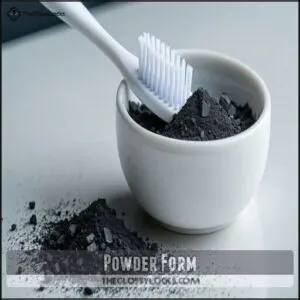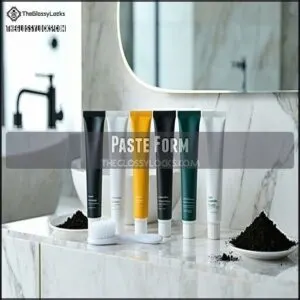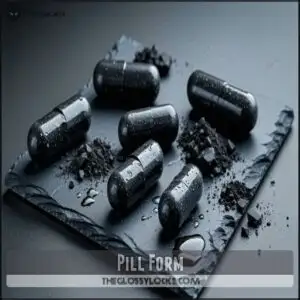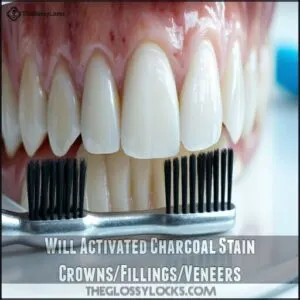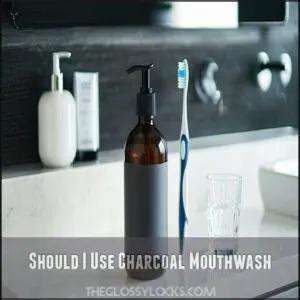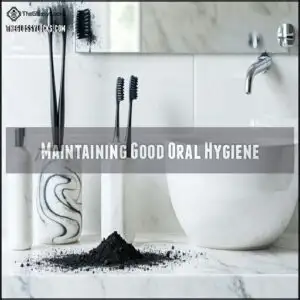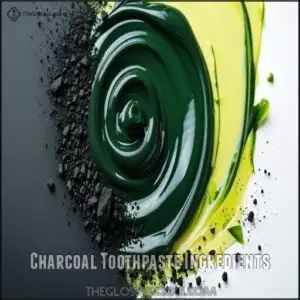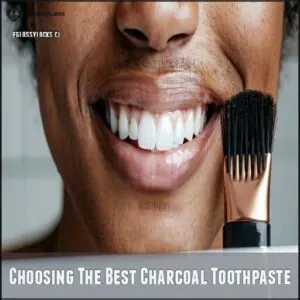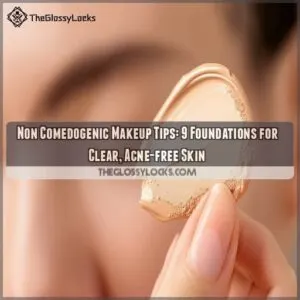This site is supported by our readers. We may earn a commission, at no cost to you, if you purchase through links.
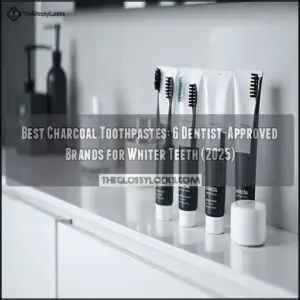 If you’re hunting for the best charcoal toothpastes, focus on options that brighten your smile without harming your enamel.
If you’re hunting for the best charcoal toothpastes, focus on options that brighten your smile without harming your enamel.
Look for dentist-approved brands like Crest Charcoal Whitening Toothpaste or Colgate Whitening with Sparkling White, which balance stain removal and safety.
Activated charcoal works by lifting surface stains, though it’s not a miracle for deep whitening. Be cautious—overuse can wear down enamel, so stick to occasional use and gentle brushing.
For a boost, try formulas with fluoride to protect against cavities. Choosing wisely lets you enjoy fresher breath and a whiter smile without sacrificing your teeth’s health.
Ready for expert-approved picks?
Table Of Contents
- Key Takeaways
- What is Charcoal Toothpaste
- Charcoal Toothpaste Benefits
- Charcoal Toothpaste Risks
- Using Charcoal Toothpaste Safely
- Charcoal Toothpaste Types
- Top 6 Best Charcoal Toothpastes
- Charcoal Toothpaste for Oral Health
- Maintaining Good Oral Hygiene
- Charcoal Toothpaste Ingredients
- Choosing The Best Charcoal Toothpaste
- Frequently Asked Questions (FAQs)
- What is the best charcoal toothpaste?
- How to use charcoal toothpaste safely and effectively?
- Is charcoal toothpaste safe?
- How do I use charcoal toothpaste?
- Which crest charcoal toothpaste is best?
- What charcoal toothpaste is the best?
- Do dentists recommend charcoal toothpaste?
- Does the charcoal toothpaste really work?
- Which charcoal is best for teeth?
- What is the best natural charcoal toothpaste?
- Conclusion
Key Takeaways
- Choose charcoal toothpastes that balance whitening with enamel protection, like those including fluoride for cavity prevention.
- Limit usage to 2-3 times a week to avoid enamel wear and sensitivity caused by the abrasiveness of charcoal.
- Activated charcoal only removes surface stains—it won’t deeply whiten teeth or change their natural shade.
- Always consult your dentist before using charcoal toothpaste, especially if you’ve got sensitive teeth or dental restorations.
What is Charcoal Toothpaste
Charcoal toothpaste contains activated charcoal, a processed form of carbon that works by binding to and removing surface stains from your teeth.
You’ll find this increasingly popular dental product in paste, powder, and pill forms, with formulations that aim to whiten teeth while balancing mouth pH and freshening breath.
History of Charcoal Toothpaste
Charcoal toothpaste boasts a rich heritage spanning millennia, with ancient remedies shaping today’s popular dental products.
A timeless tradition, charcoal toothpaste evolves ancient wisdom into modern smiles, bridging past remedies with cutting-edge oral care.
Explore how this dark paste brightened smiles throughout history:
- Ancient Greeks and Romans (400 BC) crushed charcoal with bones for teeth cleaning, creating early formulations of oral hygiene aids
- Ancient Chinese practitioners mixed charcoal with herbs for fresher breath and dental health
- Victorian-era dentists (1800s) recommended activated charcoal powders for whitening
- Modern commercial development (2010s) reintroduced charcoal with scientific adaptations and global variations
Benefits of Charcoal Toothpaste
From ancient remedies to modern dental care, activated charcoal has come a long way in oral hygiene.
Charcoal toothpaste offers meaningful benefits for your smile. Think of it as nature’s magnet for a cleaner mouth. A key factor is to look for fluoride and antibacterials to effectively combat bad breath.
| Benefit | How It Works | What You’ll Notice |
|---|---|---|
| Stain Adsorption | Binds to coffee, wine, and tobacco particles | Visibly cleaner teeth surface |
| pH Neutralization | Balances acidic environment | Reduced risk of decay |
| Breath Improvement | Captures odor-causing bacteria | Fresher breath lasting longer |
| Whitening Efficacy | Removes surface discoloration | Gradually brighter smile |
Many users report a polished feel after brushing, something you won’t get with regular toothpaste.
How Charcoal Toothpaste Works
Three remarkable mechanisms power activated charcoal toothpaste, making it a popular choice for teeth whitening enthusiasts.
This dark powder works through an adsorption mechanism, not to be confused with absorption.
When you brush with charcoal toothpaste, here’s what happens:
- Thousands of microscopic pores in each charcoal particle trap and bind to surface stains, plaque, and color-causing compounds
- The natural pH neutralization properties help balance your mouth’s acidity levels, creating an environment less friendly to cavity-causing bacteria
- Varying abrasiveness levels (depending on the formula) gently polish away discoloration without damaging enamel
Unlike bleaching agents, charcoal toothpaste benefits come from physical stain removal rather than chemical whitening.
You’ll see the most dramatic results on surface stains from coffee, tea, and wine.
Just remember – charcoal won’t change your teeth’s natural shade, only reveal it by reducing bacteria and removing what’s hiding it.
Charcoal Toothpaste Benefits
You’ll find that activated charcoal toothpaste offers several benefits, including effective removal of surface stains, balancing your mouth’s pH, and freshening your breath.
The natural absorptive properties of charcoal work to lift coffee, tea, and wine stains from your teeth while helping to neutralize harmful acids that can damage enamel, which is a key factor in maintaining oral health.
Removing Surface Stains
You’ve learned about charcoal toothpaste, but how does it tackle those stubborn stains on your smile?
The science behind charcoal’s stain-fighting power is impressive. When you brush, the porous charcoal particles work like tiny magnets to lift discoloration from your teeth’s surface.
| Stain Type | Effectiveness | Recommended Usage |
|---|---|---|
| Coffee/Tea | High | 1-2x weekly |
| Wine | Moderate | 1-2x weekly |
| Tobacco | High | 1-2x weekly |
| Food Dyes | Moderate | 1-2x weekly |
For best results, use gentle circular motions for two minutes. Unlike chemical whiteners, charcoal provides mechanical Extrinsic Stain Removal through its natural abrasiveness.
A recent study showed 79% of users noticed visible improvement within two weeks of consistent use. But don’t overdo it—dental professionals recommend limiting use to prevent potential enamel wear from charcoal’s gritty texture. Charcoal toothpaste offers a natural and effective way to remove stains, making it a great alternative to traditional whitening methods.
Balancing Mouth PH
Your mouth’s pH balance acts like a guardian for your dental health. When acids from food and oral bacteria overpower this balance, your enamel faces serious threats.
Charcoal toothpaste helps neutralize these acids, creating a more balanced oral environment. This balancing act helps protect your teeth from decay while supporting your overall oral hygiene.
Here’s how charcoal toothpaste maintains healthy pH levels:
- It absorbs excess acid-producing bacteria that can damage enamel protection
- It supports saliva’s role as your body’s natural pH regulator
- It creates conditions where harmful bacteria struggle to thrive
Unlike some products that merely mask problems, charcoal toothpaste addresses a root cause of dental issues by targeting the dietary impact on your mouth’s chemistry. It is a more effective way to maintain a healthy oral environment and support dental health.
Freshening Breath
Fresh breath follows naturally after balancing your mouth’s pH with charcoal toothpaste. The porous structure of activated charcoal excels at odor elimination by absorbing bad breath compounds rather than masking them.
For maximum breath confidence with charcoal toothpaste:
- Brush your tongue where 80% of breath-causing bacteria hide
- Choose products with natural minty flavors for longer-lasting freshness
- Use consistently in your oral hygiene routine for cumulative benefits
Many users report that charcoal toothpaste provides superior odor control compared to regular options. The bacteria reduction properties work like a magnet for smelly compounds, leaving your mouth naturally fresh.
Potential for Whitening
A bright smile doesn’t need harsh whitening treatments.
Charcoal toothpaste is a user-friendly alternative for targeting stain types like coffee, wine, or tea, balancing effective teeth whitening with enamel safety.
While it won’t change your natural tooth color, the long-term efficacy of consistent use speaks for itself, enhancing brightness over time.
Many users also incorporate mouthwash into their routine for preventing cavities.
Why activated charcoal works:
- Safely lifts surface stains, improving overall cleanliness
- Reveals natural whiteness, removing residue that dulls your smile
- Supports user expectations for gradual, noticeable improvement
- Gently brightens without relying on peroxide-based chemicals
Charcoal Toothpaste Risks
You’ll need to weigh the potential risks of charcoal toothpaste as it can damage your enamel through abrasion and may increase tooth decay when fluoride isn’t included.
While these products might offer whitening benefits, they can also cause tooth sensitivity and enamel erosion with frequent use.
Especially if you already have gum recession or sensitive teeth, the use of such products can be particularly problematic, leading to increased tooth sensitivity.
Tooth Erosion Concerns
Many dentists warn that regular use of charcoal toothpaste can substantially damage your tooth enamel over time. The high abrasiveness acts like sandpaper on your teeth, gradually wearing away the protective outer layer through consistent use.
When enamel thinning occurs, you’ll notice:
- Increased sensitivity to hot, cold, and sweet foods
- Yellowing as the dentin underneath becomes more visible
- Greater risk of gum recession exposing vulnerable tooth roots
The Relative Dentin Abrasivity (RDA) of charcoal products frequently exceeds dental safety recommendations, particularly in fluoride-free varieties. This high abrasivity level accelerates dental erosion with each brushing.
To protect your smile while still enjoying whitening benefits, consider using charcoal toothpaste just once weekly, brushing with gentle circular motions rather than aggressive scrubbing. The long-term effects of charcoal on dental health aren’t fully understood, which is why most dentists recommend consulting with a professional before making it part of your regular routine.
Potential for Tooth Decay
While pursuing that picture-perfect smile, you’re walking a thin line regarding tooth decay risks with charcoal toothpaste.
The harsh reality? Most charcoal formulations lack fluoride—your teeth’s natural defender against cavities. This fluoride importance can’t be overstated for decay prevention.
The abrasiveness of charcoal particles can gradually wear down your enamel protection, creating tiny pathways for bacteria to penetrate.
To enjoy whitening benefits while minimizing risks:
- Alternate between charcoal and fluoride-containing toothpaste daily
- Limit charcoal use to 1-2 times weekly to preserve enamel integrity
- Consider diet impact—reduce acidic foods that compound erosion effects
Even the American Dental Association hasn’t granted its Seal of Acceptance to any charcoal toothpastes, highlighting concerns about long-term safety.
Remember, saliva production helps naturally protect teeth, but it can’t compensate for damaged enamel from overly abrasive products.
Tooth Sensitivity Concerns
Beyond tooth decay, charcoal toothpaste can trigger painful sensitivity issues when enamel wears away.
That sudden zing when drinking hot coffee isn’t just annoying—it’s a warning sign.
| Sensitivity Issue | Cause | Impact | Prevention | Solution |
|---|---|---|---|---|
| Exposed Dentin | Enamel Erosion | Sharp Pain | Gentle Brushing | Sensitivity Relief Toothpaste |
| Gum Recession | Abrasiveness | Cold/Hot Pain | Soft Bristles | Fluoride Treatments |
| Micro-cracks | Charcoal Particles | Sweet/Sour Pain | Lower Abrasivity Levels | Professional Dental Visit |
| Wedge Defects | Aggressive Brushing | Persistent Ache | Proper Technique | Desensitizing Agents |
| Root Exposure | Gum Damage | Constant Sensitivity | Limited Use | Dental Bonding |
The table outlines various sensitivity issues, including exposed dentin, gum recession, micro-cracks, wedge defects, and root exposure, each with its cause, impact, prevention, and solution, highlighting the importance of gentle brushing and proper technique to prevent these issues.
Using Charcoal Toothpaste Safely
You’ll need to use charcoal toothpaste correctly to enjoy its benefits without damaging your enamel, which means brushing gently and limiting use to 2-3 times weekly.
Consulting your dentist before adding it to your routine confirms you’re choosing a product that’s right for your specific dental needs, especially if you have sensitive teeth or existing enamel concerns, and this step is crucial for enjoy its benefits.
Consulting a Dentist Before Use
Wisdom dictates speaking with your dentist before trying charcoal toothpaste. During your consultation, they’ll provide personalized advice after evaluating your enamel thickness, gum health, and existing conditions.
This critical step guarantees charcoal toothpaste ingredients won’t damage dental work or exacerbate sensitivity issues. With 92% of dentists recommending pre-use consultations, you’ll avoid potential charcoal toothpaste side effects.
You’ll receive treatment compatibility guidance customized to your specific oral health concerns.
Choosing The Right Charcoal Toothpaste
Once your dentist approves, selecting the ideal charcoal toothpaste requires careful consideration of key factors.
When evaluating best charcoal toothpaste brands, focus on these five essential elements:
- Abrasiveness Levels – lower RDA ratings prevent enamel damage
- Fluoride Inclusion – essential for preventing cavities
- Flavor Preferences – from mint to unflavored options
- Sensitivity Issues – gentler formulations for reactive teeth
- Brand Reputation – consider charcoal toothpaste reviews from trusted sources
It’s important to check the toothpaste abrasiveness levels before use.
Remember, long-term dental health matters more than immediate whitening results from charcoal toothpaste effectiveness claims.
Using Charcoal Toothpaste Sparingly
Most dental experts agree that charcoal toothpaste should be used sparingly for maximum enamel protection.
Limit your usage to 1-2 times weekly to balance whitening benefits with gum health.
Daily application can gradually wear down tooth structure and increase sensitivity.
The best charcoal toothpaste reviews confirm that effectiveness doesn’t require frequent use—your fluoride toothpaste should remain your daily go-to for maintaining oral health.
Proper Brushing Techniques
While using charcoal toothpaste sparingly protects your enamel, how you brush matters just as much.
Master these techniques for safe and effective whitening:
- Control your pressure: Use a light touch with a soft-bristled brush—your teeth aren’t dirty dishes that need scrubbing! Too much force can damage enamel.
- Focus on the gumline: Hold your brush at a 45° angle where plaque loves to hide, using gentle circular motions for thorough cleaning.
- Complete your routine: Brush for two minutes, clean your tongue with a scraper, then rinse thoroughly to remove all charcoal residue.
After brushing, check your smile in the mirror—charcoal particles often hide between teeth.
Your dental hygiene routine should feel comfortable, not abrasive. Remember, effective plaque removal doesn’t require force—just proper technique.
Charcoal Toothpaste Types
In the context of charcoal toothpaste, you’ve got options like powders, pastes, and even pills, each with unique benefits.
Understanding their differences helps you pick one that fits your routine and oral health needs.
Powder Form
After learning proper safety techniques, you might be curious about charcoal powder forms.
Charcoal powder represents teeth whitening in its purest form. Made from activated charcoal derived from wood or coconut shells, these fine-grain powders offer impressive stain removal with minimal ingredients.
While effective, powder messiness is the main drawback. You’ll need to carefully apply the loose powder to your wet toothbrush before brushing.
The key advantages include:
- Complete ingredient purity (often just one ingredient)
- Customizable application methods
- Higher potency for stubborn stains
However, be mindful of abrasiveness levels, as powders can be harsher on enamel than paste alternatives. You can even purchase various charcoal powders online. Many users accept this trade-off for the powder’s simplicity and effectiveness.
Paste Form
Charcoal toothpaste in paste form offers convenience without the mess of powder varieties.
You’ll find these formulations easier to integrate into your daily usage routine—simply squeeze and brush.
Most paste options balance effective teeth whitening with enamel safety by combining activated charcoal with protective ingredients like fluoride.
The grittiness levels vary between brands, with some offering a smoother texture for sensitive teeth.
Flavor variety ranges from mint to coconut, making your whitening experience more pleasant.
Dental health experts often recommend paste forms for their consistent application and controlled dosage.
They’re the perfect middle-ground for those wanting charcoal benefits without the cleanup hassle.
Many consumers are now buying charcoal toothpaste products.
Pill Form
Many travelers are turning to pill form charcoal toothpaste for its incredible convenience and portability. Unlike messy powders or leaky tubes, these compact tablets offer a perfect solution for maintaining your dental health on the go.
Simply chew a tablet, add water, and brush for effective teeth whitening anywhere.
- Precise Dosage Control: Each pill provides consistent charcoal concentration for reliable results
- Sustainable Packaging: Most brands use minimal, eco-friendly materials that reduce plastic waste
- Superior Travel Convenience: TSA-friendly and doesn’t count toward your liquid allowance
The dissolving rate varies by brand, but most pills completely activate within 10-15 seconds.
For maximum pill efficacy, dentists recommend crushing the tablet thoroughly before brushing to guarantee even distribution across your teeth.
Top 6 Best Charcoal Toothpastes
You’ll find our carefully selected charcoal toothpastes combine effective whitening power with gentle formulations that won’t damage your enamel.
These dentist-approved options offer something for every preference, from fluoride-containing formulas for cavity protection to all-natural alternatives with coconut oil and other beneficial ingredients, providing a range of choices that cater to different needs and preferences for effective oral care.
1. Activated Charcoal Teeth Whitening Toothpaste
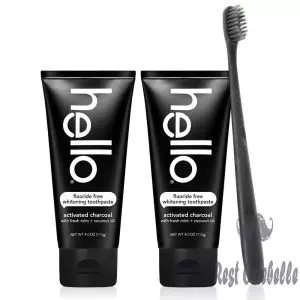
If you want a brighter smile without harsh chemicals, Epic Whitening’s Activated Charcoal Teeth Whitening Toothpaste is a fantastic choice.
This kit includes two 4-ounce tubes and a toothbrush with charcoal-infused bristles for extra cleaning power.
Made with sustainable bamboo charcoal, it effectively tackles stains from coffee, tea, and wine.
Its fluoride-free, SLS-free formula is gentle on enamel and features a revitalizing minty flavor.
Vegan and cruelty-free, it’s safe for daily use and leaves teeth feeling clean and smooth.
Best For: People looking for a natural, vegan, and fluoride-free option to remove surface stains and freshen their breath.
- Effective in removing surface stains for a brighter smile.
- Vegan, cruelty-free, and free from harsh chemicals.
- Includes a BPA-free toothbrush with charcoal-infused bristles.
- Fluoride-free formula may not appeal to all users.
- Overuse could risk enamel thinning due to abrasiveness.
- Requires careful storage away from pets due to xylitol content.
2. Charcoal Toothpaste for Whitening
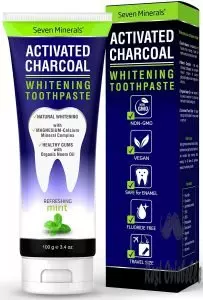
If you’re seeking a gentler alternative to chemical whiteners, charcoal toothpaste for whitening might be your answer.
This popular option combines activated charcoal with remineralizing minerals like calcium glycerophosphate and magnesium chloride to tackle surface stains while strengthening your teeth.
Unlike harsh bleaching agents, these formulas work through mechanical action, gently lifting away coffee, tea, and wine discoloration. The fresh mint flavor leaves your mouth feeling clean without the chemical aftertaste of conventional whiteners.
Keep your expectations in check, though. While many users report smoother, brighter teeth with regular use, results aren’t as dramatic as professional treatments. It’s a trade-off worth considering—natural ingredients and gentler action in exchange for more gradual results.
Best For: People seeking a natural, bleach-free alternative for gradual teeth whitening and remineralization.
- Gradual whitening results, not as effective as professional treatments.
- Abrasiveness risks enamel erosion with prolonged use.
- Tube may feel overpriced due to being partially filled.
- Contains natural ingredients that support gum health and reduce sensitivity.
- Helps remove surface stains for a brighter smile over time.
- Offers a pleasant minty flavor and smooth brushing experience.
3. Probiotic Toothpaste with Charcoal
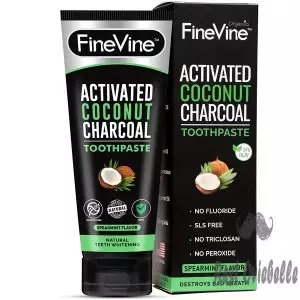
Inside the Hyperbiotics Activated Charcoal Probiotic Toothpaste, you’ll find a revolutionary blend that tackles oral health from two angles.
This formula combines targeted Lactobacillus paracasei probiotics with activated coconut charcoal to support your mouth’s microbiome while gently whitening teeth. You’ll notice it’s completely free from artificial flavors, colors, and preservatives.
The spearmint-flavored paste uses xylitol to target unhealthy bacteria while preserving beneficial ones. Its vegan, non-GMO formula includes organic coconut oil, diatomaceous earth, and tea tree oil for complete care.
Clinical trials have shown this unique combination helps prevent dental caries while maintaining enamel integrity. Many users report whiter teeth and fresher breath, though some need time to adjust to its texture.
Best For: Individuals seeking a natural, vegan toothpaste that supports oral health with probiotics and gentle whitening properties.
- Combines probiotics and activated charcoal for oral health and teeth whitening.
- Free from artificial flavors, colors, and preservatives; vegan and non-GMO formula.
- Includes xylitol and essential oils for fresher breath and a healthier mouth.
- Mixed user reviews on taste and texture, with some finding it unpleasant.
- Charcoal’s abrasiveness may pose risks to enamel over long-term use.
- Higher price point compared to standard toothpaste options.
4. Activated Charcoal Whitening Toothpaste
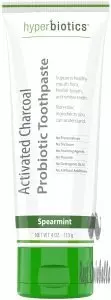
Looking for real whitening power? Activated Charcoal Whitening Toothpaste stands out from the crowd with its scientifically-formulated bamboo charcoal base.
This toothpaste works through adsorption—a process where the highly porous charcoal particles bind to surface stains from coffee, wine, and tobacco, lifting them away without harsh chemicals.
Your teeth get gradually whiter with each use, though it’s most effective on extrinsic (surface) stains rather than deep discoloration. For enamel protection, dentists recommend using it just 2-3 times weekly instead of daily.
Consider it the "deep cleaner" in your oral care routine. The fine black powder might temporarily stain your sink (just rinse thoroughly!), but many users find the tradeoff worthwhile for noticeably brighter teeth without the sensitivity that chemical whiteners can cause.
Best For: Adults looking for a natural, fluoride-free toothpaste to gently remove surface stains and support oral health.
- Can stain sinks and has a messy application due to black color.
- Limited whitening effects, primarily working on surface stains.
- Higher price point compared to traditional toothpaste.
- Natural formula with activated charcoal for surface stain removal.
- Vegan, fluoride-free, and free from harsh chemicals.
- Supports oral health with probiotics and xylitol for reducing harmful bacteria.
5. Crest Charcoal Whitening Toothpaste
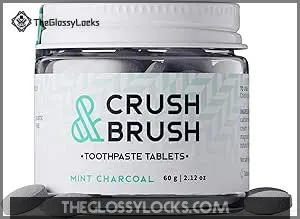
Crest Charcoal Whitening Toothpaste stands at the crossroads of natural whitening and proven cavity protection.
This clever formula combines activated charcoal with fluoride, offering the stain-fighting properties you want while still preventing cavities—something many pure charcoal products lack.
The gentle abrasives won’t damage your enamel like harsher alternatives, making it safe for regular use.
Available in invigorating mint or tropical coconut flavors for $5-8, it’s an affordable option for those seeking professional results.
While patience is required—expect visible results in 2-4 weeks—76% of users report noticeable whitening.
It’s particularly effective on stubborn coffee, tea, and tobacco stains without the sensitivity issues common with stronger whitening products.
Best For: People seeking affordable whitening toothpaste with cavity protection and minimal enamel damage.
- Combines natural whitening and fluoride for cavity prevention.
- Gentle abrasives reduce enamel damage.
- Affordable and effective for coffee, tea, and tobacco stains.
- Results may take 2-4 weeks to become noticeable.
- Some users may not prefer the mint or coconut flavors available.
- May not offer the strength of professional whitening treatments.
6. Colgate Whitening Toothpaste Sparkling White
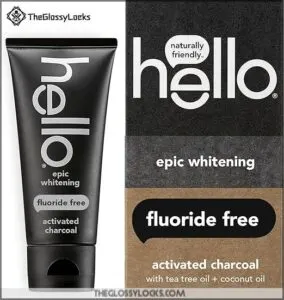
Countless users trust Colgate Whitening Toothpaste Sparkling White for its dual-action formula combining activated charcoal with 2% hydrogen peroxide.
You’ll notice gradual whitening as it gently lifts surface stains without harming your enamel.
Unlike other charcoal options, it contains plaque-fighting fluoride for complete protection.
The invigorating mint flavor leaves your mouth feeling clean, without the messy black residue common with pure charcoal products.
Many dentists recommend this as a balanced option for those new to charcoal toothpaste.
Available in convenient 4.8 oz tubes, it’s typically sold in economical two-packs.
For best results, use it consistently but moderately—your smile will thank you for the gentle care.
This approach ensures you get the most out of Colgate Whitening Toothpaste Sparkling White, with its unique blend of ingredients for a healthier, whiter smile, making it a great choice for complete protection.
Best For: People seeking a safe, enamel-friendly toothpaste with a balance of whitening and fluoride protection.
- Does not remove deep stains below the enamel.
- May not appeal to users avoiding fluoride-based products.
- Limited availability in single tubes as it’s often sold in two-packs.
- Combines activated charcoal and hydrogen peroxide for effective surface stain removal.
- Contains fluoride for plaque prevention and complete oral care.
- Mint flavor offers a fresh, clean feeling without black residue.
Charcoal Toothpaste for Oral Health
You’ll find that charcoal toothpaste can improve your overall oral health by neutralizing mouth acidity and reducing harmful bacteria that cause bad breath.
Beyond just whitening teeth, quality charcoal toothpastes work to maintain a balanced oral environment, though you should always confirm they’re safe for your specific dental work and health conditions.
Will Activated Charcoal Stain Crowns/Fillings/Veneers
Having invested in crowns, fillings, or veneers, you’ll want to know how activated charcoal affects these dental restorations. Unlike natural enamel, your dental work responds differently to charcoal toothpaste.
The abrasive nature of charcoal creates several concerns for your restorations:
- Crown material can develop micro-scratches from charcoal particles, reducing shine by up to 50% over time
- Filling discoloration occurs when charcoal particles lodge in tiny crevices between restorations and natural teeth
- Veneer staining is common as porcelain surfaces are particularly vulnerable to the rough texture of activated charcoal
For ideal dental health, limit charcoal toothpaste use to once weekly with restorations. Always rinse thoroughly for at least 30 seconds afterward to remove trapped particles. Consider consulting your dentist about teeth whitening alternatives specifically designed for patients with dental work.
Is Charcoal Toothpaste Safe for Pregnant Women or Children
Charcoal toothpaste might be trendy, but its safety for pregnant women and children warrants caution.
Here’s what you need to know:
- Pregnancy Safety: Talk to your healthcare provider, as some products may contain lead or interfere with essential nutrient absorption.
- Child Usage: The ADA doesn’t approve charcoal toothpaste for kids due to developing enamel risks.
- Fluoride Concerns: Charcoal toothpaste often lacks fluoride, increasing cavity risks in children and expectant mothers.
- Enamel Impact: Its abrasiveness can erode enamel over time.
Opt for fluoride-based, ADA-approved alternatives to guarantee safe and effective oral care for the whole family.
Expectant mothers should also be aware of hormonal skin changes that might necessitate adjustments to their skincare routine.
Should I Use Charcoal Mouthwash
If you’re considering charcoal mouthwash, it’s great for freshening breath and reducing bacteria but skips teeth whitening since stains need direct brushing.
Popular options like Hello’s alcohol-free formula ($6.99/16oz) are gentle and vegan-friendly, avoiding harsh ingredients.
While it’s a decent oral hygiene boost, it’s not for daily use, focus on brushing and flossing, and use mouthwash occasionally.
If you’re worried about charcoal side-effects, alternative rinses with fluoride or natural oils might suit your routine better.
Maintaining Good Oral Hygiene
You can keep your teeth healthy and bright by sticking to a consistent oral care routine.
Brushing properly, using charcoal toothpaste occasionally, and avoiding habits that cause stains are key steps to maintaining a clean, confident smile.
Preventing Discoloration
Stains from coffee, tea, or red wine can stick like stubborn glue.
Protect your enamel and keep teeth bright with these quick habits:
- Rinse with water after consuming stain sources like coffee or red wine.
- Brush gently with charcoal toothpaste, prioritizing enamel protection.
- Opt for a straw to limit contact with staining beverages.
- Schedule professional cleanings every six months for effective stain removal.
- Choose whitening toothpaste made with activated charcoal to address surface stains safely.
Consistency matters—small steps guarantee long-term teeth whitening success, and with these habits, you can achieve bright teeth.
Using Charcoal Toothpaste Occasionally
It’s smart to keep charcoal toothpaste as an occasional tool rather than a daily habit. Think of it as your whitening toothpaste for special tasks—like tackling stubborn coffee or wine stains.
Using it too often can harm your enamel and increase tooth sensitivity.
For the best results without risks, follow these simple steps:
- Use activated charcoal toothpaste 1-2 times a week to enjoy whitening benefits while managing enamel impact and sensitivity.
- Brush with fluoride toothpaste the rest of the week to maintain cavity protection and overall oral health.
- Choose a soft-bristled toothbrush and apply gentle pressure to minimize abrasiveness during use.
Remember, occasional use benefits your smile while protecting your enamel—balance is the key to brighter, healthier teeth.
Charcoal Toothpaste Ingredients
When choosing a charcoal toothpaste, you’ll want to understand what’s inside the tube.
Key ingredients like activated charcoal, fluoride, and natural additives can make all the difference in whitening and protecting your teeth.
While avoiding unnecessary abrasives or harmful chemicals is crucial, the right combination of ingredients can provide effective results, making natural additives a valuable component in the process.
Key Ingredients to Look For
When you’re on the hunt for the perfect activated charcoal toothpaste, it’s all about the ingredients that keep your teeth shining without causing harm.
Activated charcoal steals the spotlight for stain removal, but look for a fine-ground, medical-grade variety to minimize abrasiveness.
Pairing it with fluoride is a game-changer—fluoride charcoal toothpaste offers cavity protection, typically with 1000-1500 ppm content.
Natural ingredients like coconut oil or aloe vera add a soothing touch, while antibacterial agents like peppermint or tea tree oil keep your mouth fresh and clean.
Don’t forget xylitol, a natural sweetener that fights bacteria while keeping brushing enjoyable.
Got charcoal toothpaste sensitivity? Potassium nitrate can help calm irritated teeth without sacrificing the charcoal benefits.
A smart balance of these elements guarantees a brighter, healthier smile.
Avoiding Harsh Ingredients
Your teeth deserve protection, not punishment, so avoid toothpaste with harsh ingredients that can hurt your gums or enamel. Sodium lauryl sulfate (SLS) is a common culprit, known for its foaming but irritating effects. Triclosan, often found in antibacterial formulas, can also pose risks to oral health.
Instead, pick charcoal toothpaste with low abrasiveness levels to shield enamel and prevent tooth sensitivity. Many toothpastes also contain sulfates, but understanding common ingredients is essential for oral health.
Look for products with safe, natural antibacterials or activated charcoal for whitening. If you prefer, choose fluoride-free options.
- Go for SLS alternatives for gentler cleaning.
- Check for natural antibacterials to fight plaque.
- Avoid added chemicals that erode enamel.
- **Opt for low-abrasion formulas.
- **Focus on safe herbal blends.
Choosing The Best Charcoal Toothpaste
When choosing the best charcoal toothpaste, focus on ingredients, safety, and effectiveness. Look for options that balance whitening benefits with enamel protection to keep your teeth healthy.
Energy Transition Challenges
Switching to the best charcoal toothpaste isn’t just about natural teeth whitening—it’s about supporting a cleaner planet.
With activated charcoal products, you can spot brands tackling today’s energy challenges. Consider these factors:
- Policy Implementation: Some whitening toothpaste brands follow eco-friendly guidelines, meaning fewer harmful impacts.
- Technological Innovation: Look for companies advancing green manufacturing, reducing carbon footprints.
- Public Acceptance: Brands emphasizing sustainability often promote trust, showing commitment to responsible choices.
By choosing eco-conscious whitening toothpaste or charcoal powders, you’re investing in oral health while encouraging smarter financial investments and workforce retraining for a greener future.
Renewable Investment Strategies
Looking for the best whitening toothpaste that’s effective and eco-friendly? Treat your teeth like a Renewable Portfolio Standard—balancing health and sustainability.
Here’s how to pick a winner:
- Green Bonds: Opt for activated charcoal toothpaste with organic, plant-based ingredients.
- Tax Incentives: Choose products with sustainable packaging and fluoride (for cavity prevention).
- Community Solar: Support brands investing in eco-friendly practices, like My Magic Mud or Hello Activated Charcoal.
- Energy Storage: Pick low-abrasive toothpaste to protect enamel over time.
A proper whitening toothpaste comparison will highlight brands blending safety, innovation, and value—like a great investment in your radiant smile!
Grid Modernization Efforts
Choosing the best whitening toothpaste, especially one with activated charcoal, is like upgrading to Smart Grids in energy systems—it’s all about efficiency and balance.
Charcoal toothpaste acts like Energy Storage for your teeth, targeting surface stains while fluoride helps prevent cavities.
Opt for a formula with low abrasiveness to protect enamel, much like Microgrids protecting critical power networks.
For added safety, focus on brands with natural ingredients that support healthy gums without harsh chemicals.
Think of your dental health as Cybersecurity for your smile—using whitening toothpaste wisely prevents damage while enhancing brightness.
With consistent care and thoughtful choices, your oral care routine can feel just as progressive as modern Policy Changes in energy infrastructure.
Keep your smile connected and cared for!
Critical Infrastructure Adaptation
Think of your oral care like preparing for climate change—building infrastructure resilience for your smile.
The right toothpaste strengthens foundations and protects against risks, much like balancing sustainability and safety in city planning.
Here’s how to choose the best toothpaste for whitening with activated charcoal:
- Prioritize Material Innovation: Pick sustainable options, like charcoal from coconut shells.
- Balance Safety with Results: Look for low-abrasion formulas to avoid tooth erosion or sensitivity.
- Focus on Risk Assessment: Fluoride-infused pastes offer dual protection against cavities and stains.
- Review Policy Changes: Check ingredient labels closely to avoid harsh additives impacting enamel long-term.
Frequently Asked Questions (FAQs)
What is the best charcoal toothpaste?
In the context of whitening safely, Hello Activated Charcoal Toothpaste stands out.
With natural ingredients like coconut oil and bamboo charcoal, it’s gentle yet effective, offering a minty, fresh feel while keeping harmful chemicals at bay.
How to use charcoal toothpaste safely and effectively?
Brush gently to avoid enamel damage, using a soft-bristle toothbrush.
Limit use to 2-3 times a week, alternating with fluoride toothpaste for cavity protection.
Rinse thoroughly, and consult your dentist for personalized advice.
Is charcoal toothpaste safe?
Scrubbing your teeth with charcoal toothpaste might sound like polishing pearls with sandpaper.
It can whiten slightly, but frequent use risks enamel damage and sensitivity.
Check for fluoride, use sparingly, and always consult your dentist.
How do I use charcoal toothpaste?
Apply a pea-sized amount to your toothbrush, gently brush in small circles for two minutes, avoiding aggressive scrubbing.
Rinse thoroughly to remove residue.
Don’t overuse—stick to 2-3 times weekly to protect enamel.
Which crest charcoal toothpaste is best?
If you’re tired of dull whitening gimmicks, Crest Charcoal 3D White stands out.
It’s gentle, fluoride-packed, and polishes stubborn stains without mess.
Perfect for safe daily use, it’s as effective as it’s reliable.
What charcoal toothpaste is the best?
The best charcoal toothpaste depends on your needs.
Try Hello Activated Charcoal for natural ingredients, Crest 3D White for fluoride protection, or My Magic Mud for gentler whitening.
Always check with your dentist for personalized recommendations.
Do dentists recommend charcoal toothpaste?
Dentists debate charcoal toothpaste’s desirability, often disapproving due to its abrasive nature, risking enamel damage.
They’ll stress safety first, suggesting fluoride options or personalized advice.
Whitening wonders shouldn’t outweigh long-term tooth health—a brush with wisdom!
Does the charcoal toothpaste really work?
Charcoal toothpaste can remove surface stains and brighten teeth, but results vary.
It’s not a miracle fix, and overuse might erode enamel.
Choose one with fluoride for cavity protection, and consult your dentist first.
Which charcoal is best for teeth?
Look for activated coconut charcoal—it’s natural, less abrasive, and effectively traps surface stains.
Pair it with fluoride toothpaste or consult your dentist to avoid enamel damage and guarantee your teeth stay protected while whitening.
What is the best natural charcoal toothpaste?
If you want something natural, Hello Activated Charcoal Toothpaste is a great pick.
It’s vegan, fluoride-free, and made with ingredients like coconut oil and bamboo charcoal, offering effective whitening without harsh chemicals or additives. Effective whitening without harsh chemicals or additives.
Conclusion
Brightening your smile can feel like uncovering buried treasure, but the best charcoal toothpastes guarantee safety while revealing whiter teeth.
Choose dentist-approved options, focus on fluoride for cavity protection, and avoid overuse to prevent enamel wear.
Remember, charcoal toothpastes excel at lifting surface stains but won’t deliver deep whitening miracles.
Use them sparingly alongside a solid oral hygiene routine, and consult your dentist for personalized advice.
With wise choices, a healthier, brighter smile awaits!

